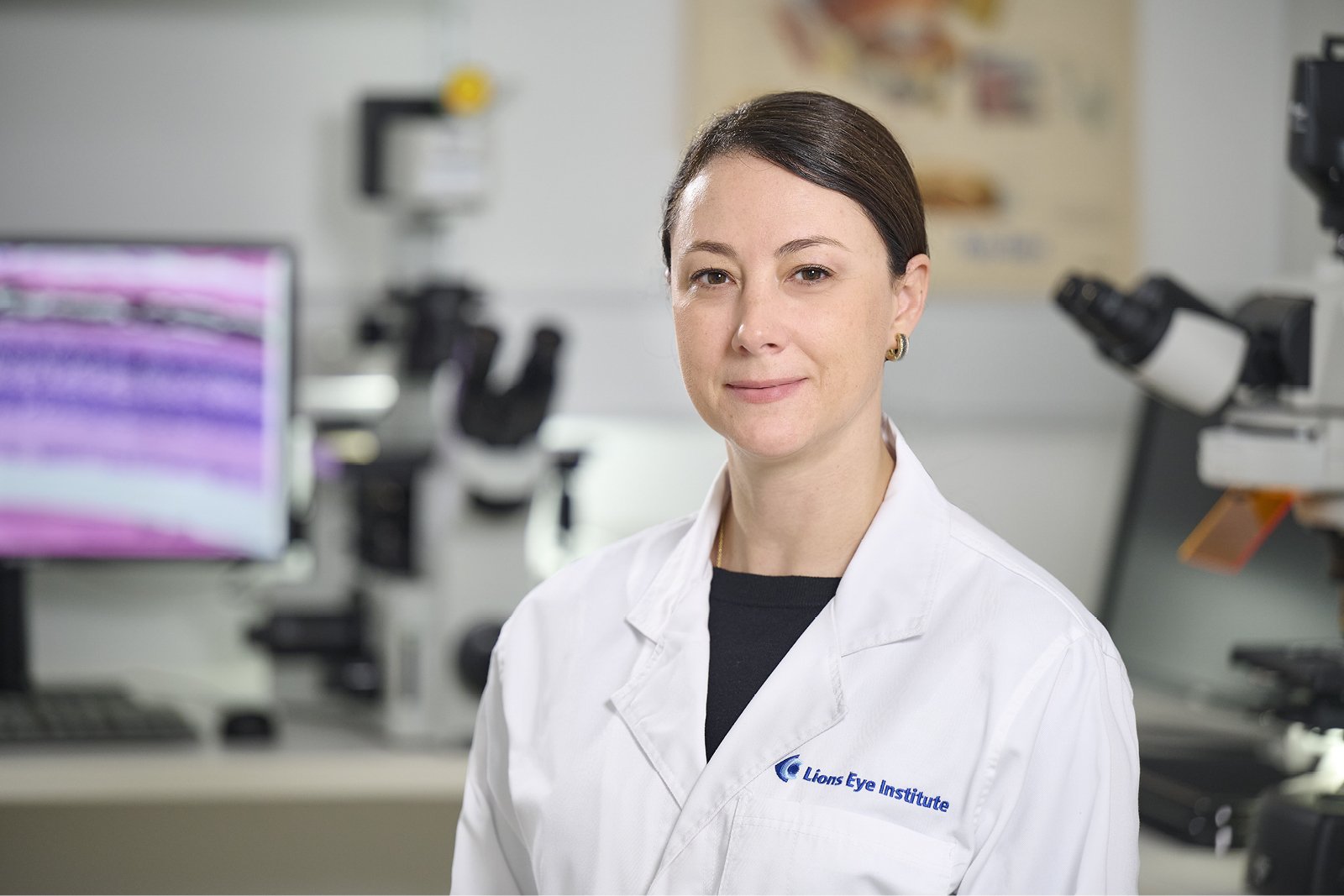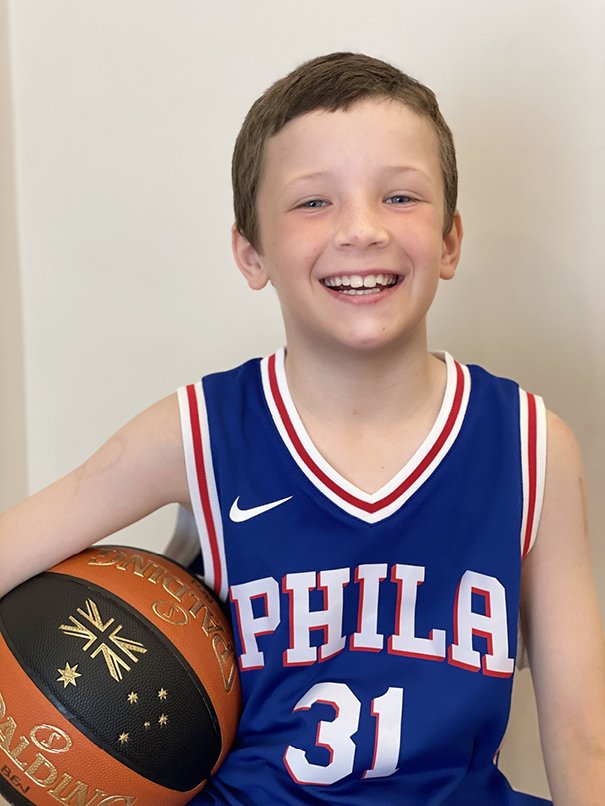SEEING IS ACHIEVING AT THE LIONS EYE INSTITUTE
Dr. Livia Carvalho
With more than forty years of research and clinical experience in the prevention, diagnosis and treatment of eye-disease, the Lions Eye Institute is guided by a simple mission: “better vision for all”.
The Institute was founded in 1983 with the support of Lions Clubs across Western Australia, following the successful appointment of a Lions Chair of Ophthalmology at the University of Western Australia in 1975.
Today, the Lions Eye Institute clinics are a familiar but crucial part of the state’s health system, treating approximately 60,000 patients each year; the Institute also plays host to advanced research and surgical facilities, and has extended its work into rural, remote and regional WA through Lions Outback Vision.
Although many of us will associate vision problems with ageing, some of the most significant projects underway at the Lions Eye Institute seek to address the impact of eye-disease on children and adolescents.
Inherited Childhood Retinal Diseases (IRDs) are a genetically diverse group of conditions which affect approximately 1 in every 2000 people across the globe, and are a leading cause of blindness in Australian children.
In 2021, the Stan Perron Charitable Foundation awarded a Health Research Grant to Dr. Livia Carvalho, whose research forms part of a national and global effort to model and design new treatments for IRDs.
Dr. Carvalho’s work focuses on different types of IRDs, including retinitis pigmentosa, Achromatopsia, cone-rod dystrophy and Type 1 Usher Syndrome (USH1F), all rare genetic disorders with early onset which causes vision loss through the degeneration of cells in the retina.
As well as contributing to a better understanding of how and why these types of IRDs occur, Dr. Carvalho is currently working towards the development of a cutting-edge and novel gene and neuroprotection therapies that can be tested using miniature, lab-grown replicas of the human eye known as organoids.
In another program of research supported by the Stan Perron Charitable Foundation, a team of researchers at the Institute led by Prof Dao-Yi Yu AM are investigating diabetic retinopathy, a condition which results from damage to blood cells at the back of the eye. Diabetic retinopathy is also a leading cause of vision loss for children and young people in Western Australia.
Australia has one of the highest rates of type 1 diabetes in the world, with nearly 2,500 new cases each year – an average of seven new cases per day.
The impact of diabetic retinopathy is expected to increase in coming years due to the growing number of Australian children diagnosed with type 1 diabetes. Loss of vision is a particular concern for Aboriginal and Torres Strait Islander communities, who are nearly five times more likely to suffer from diabetes compared to non-Indigenous Australians.
In response to this emerging crisis, the Foundation is supporting Lions Eye Institute in the formation of the Perron Paediatric Retinopathy Initiative — a state-of-the-art platform for collaborative research and clinical services aimed at preventing and alleviating diabetic retinopathy in children and young people.
The research arm of this program seeks to develop new methods for detecting and managing vision loss, through a collaboration between the Lions Eye Institute, Telethon Kids Institute, Perth Children’s Hospital, Diabetes WA and the Harry Perkins Institute of Medical Research.
Researchers also work closely alongside clinical staff at Perth Children’s Hospital in the operation of an ophthalmic screening and treatment program, which saw 80 children between March and December 2021.
According to Associate Professor Chandra Balaratnasingam, the world class screening facilities provided by the Perron Paediatric Retinopathy Initiative will play an important role in combating the growing threat to children’s eyesight posed by diabetes.
“When you consider almost 100 percent of children with type 1 diabetes will develop vision problems in their lifetime, this is a very serious issue for these young people and their families,” said Prof. Balaratnasingam, a surgeon and scientist at the Lions Eye Institute who specialises in diabetic and vascular retinopathies.
Thanks to the partnership between the Stan Perron Charitable Foundation and the Lions Eye Institute, Western Australian families can protect their vision today while also looking ahead to a better and brighter tomorrow.
Ben is among the participants of the Perron Paediatric Retinopathy Initiative
Foundation partners with The Lions Eye Institute to save kids’ eyesight
Type 1 diabetes affects a growing number of Western Australian children each year, putting them at increased risk of severe and permanent vision loss.
Most children diagnosed with the disease will develop diabetic retinopathy — a progressive deterioration of the blood vessels at the back of the retina which, if not managed properly, can result in blindness.
For parents and families of children with diabetes, vision loss is a concern which adds to the strain of managing the disease on a daily basis.
“Type 1 diabetes requires the constant management of blood sugar, 24 hours a day, seven days a week, with no days or nights off,” said Jo, whose son Ben was diagnosed with the condition at age three.
“As a parent, not only are you managing the short term blood sugar levels, you also worry about the long term complications.”
Fortunately for Jo and her family, Ben is now among the participants of the Perron Paediatric Retinopathy Initiative (PPRI) — a partnership between the Lions Eye Institute, Perth Children’s Hospital and the Stan Perron Charitable Foundation which provides world-class ophthalmic screening facilities for Western Australian children living with diabetes.
“Screening children at regular intervals will enable us to detect complications at the earliest stages. It’s the key to avoiding irreversible vision loss in children,” said Associate Professor Chandra Balaratnasingam, a scientist and surgeon at the Lions Eye Institute.
With the support of other leading institutions in WA, including Telethon Kids Institute, Harry Perkins Institute of Medical Research and Diabetes WA, researchers involved with the PPRI are also working to develop new ways of detecting vision loss in children and cutting-edge therapies to treat diabetic retinopathy.
Funding provided by the Foundation means that, as scientists search for new and better treatments, kids like Ben can access state-of-the-art technology and the Lions Eye Institute’s decades of clinical expertise in the prevention and detection of eye diseases.
“Knowing there is an organisation that is assisting you in monitoring the long-term effects of type 1 diabetes provides peace of mind that your child has the best possible chance of preserving their eyesight and living a normal life,” said Jo.
“I am very thankful that Ben is a part of the Lions Eye Institute study. Preventing eyesight loss is so important to ensure he can continue to live his life to the full, and that diabetes won’t stop him from enjoying playing sport and being a kid.”
To discover more, visit: www.lei.org.au/research/
Published: 13 September 2022


